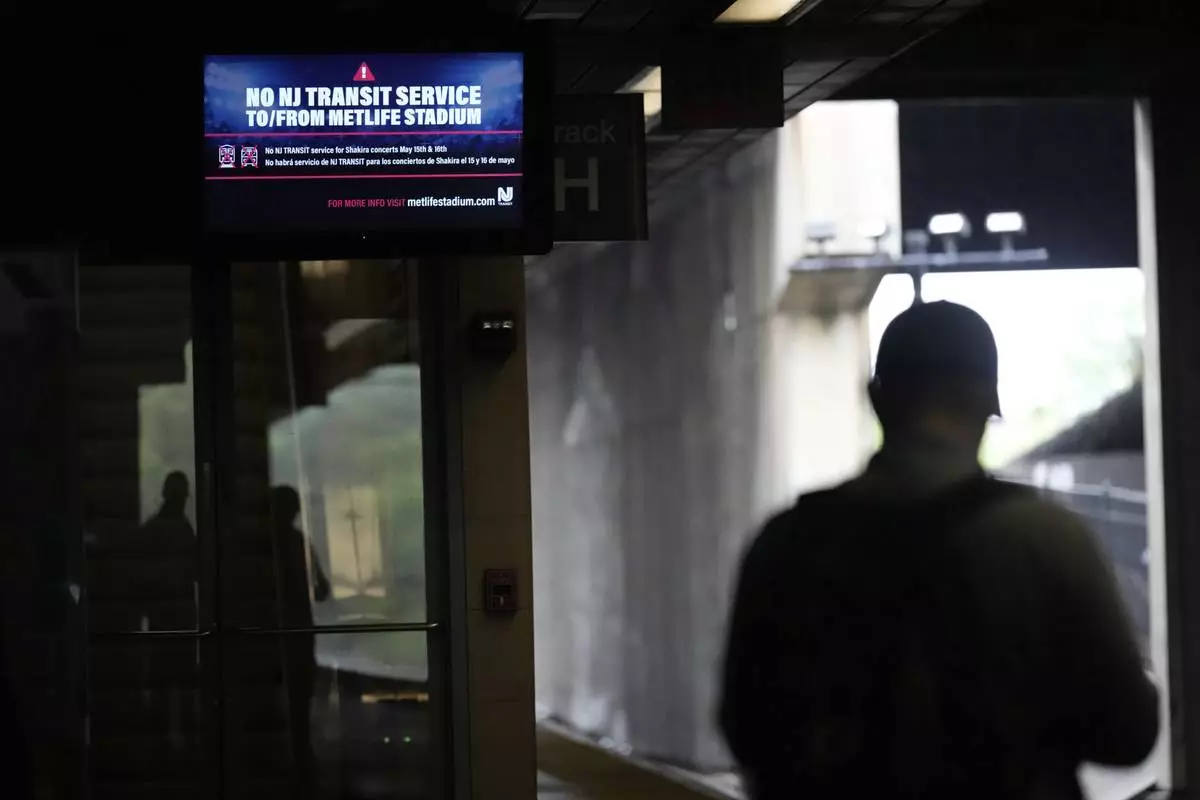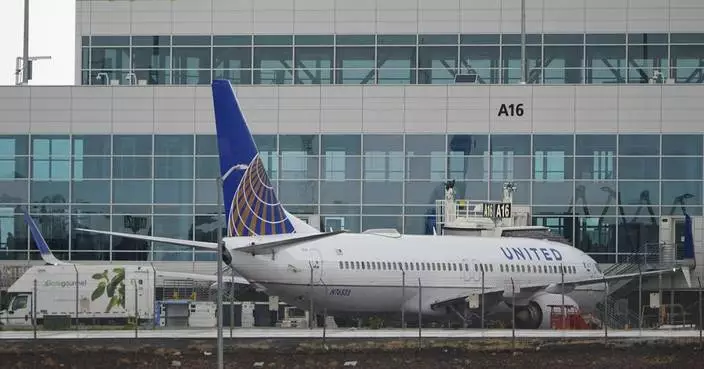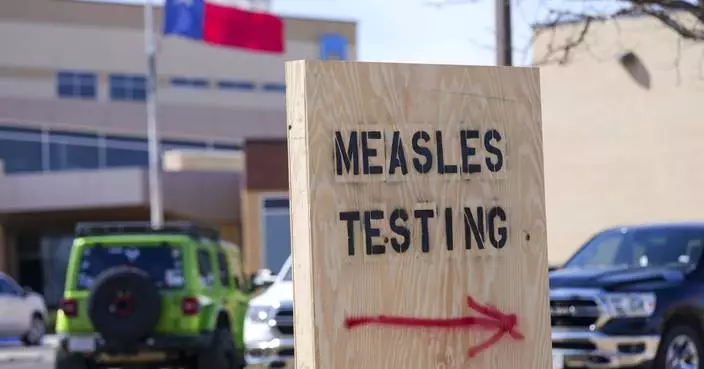After a spellbinding five-day trial that featured tales of infidelity and a multimillion dollar insurance payout, a jury on Friday convicted a Florida woman of helping mastermind the killing of her husband nearly two decades ago.
Jurors found Denise Williams guilty of three counts including first-degree murder and conspiracy to commit murder for her role in a case that has recalled the plot of the Hollywood film classic "Double Indemnity." The 48-year-old Williams was found guilty after testimony by a key witness, the man who shot her husband Mike Williams on a cold December morning on a large lake west of Tallahassee.
Jurors deliberated eight hours before reaching a verdict. Denise Williams, who could spend the rest of her life in prison, is to be sentenced at an unspecified date next year.

FILE - In this Wednesday, Dec. 12, 2018 file photo, Brian Winchester sits on the witness stand during cross-examination in the trial of Denise Williams in Tallahassee, Fla. Williams, of Florida, has been convicted of helping mastermind the killing of her husband nearly two decades ago. Jurors convicted Williams of first-degree murder Friday, Dec. 14, 2018, and conspiracy to commit murder for the shooting death of her husband Mike Williams. (Alicia DevineTallahassee Democrat via AP, Pool, File)
Mike Williams disappeared nearly 18 years ago to the date of his wife's conviction. He left early on the morning of Dec. 16, 2000, to go duck hunting, and initially some speculated he had fallen from his boat and that his body had been devoured by alligators. His disappearance triggered a massive search by authorities.
But Brian Winchester, who had been Mike Williams's best friend, said he and Denise Williams were having an affair and that they planned the killing. Denise Williams ultimately received $1.75 million in life insurance payments, including a $1 million policy that Winchester himself had sold Mike Williams.
In the film "Double Indemnity," an insurance agent helps his lover kill her husband in order to cash in on a life insurance policy.
Winchester said he planned to make it look like Williams had drowned. But after pushing him overboard, Williams did not get dragged underwater by his duck-hunting equipment. So Winchester said he shot him in the face with a 12-gauge shotgun. He then dragged his body to shore, put him in the back of his truck and drove back to Tallahassee. He eventually buried him later in the day alongside a small lake located north of town.
Without a body, Denise Williams petitioned to have her husband declared dead due to accidental drowning. Winchester and Denise Williams married in 2005 but the relationship soured and they divorced in 2016.
The case broke after Winchester kidnapped his ex-wife at gunpoint in 2016, authorities said. He eventually made a deal with prosecutors and was sentenced to 20 years in prison for that crime. But Winchester ultimately led authorities to the remains of Mike Williams.
Ethan Way, an attorney for Denise Williams, told jurors during closing statements that his client was innocent and that there was no tangible proof that Denise Williams helped plan the slaying of Mike Williams. Instead he maintained that Winchester was lying in order to avoid murder charges and get revenge on his ex-wife.
"They gave a free pass to a murderer and got nothing else," Way told jurors in his closing statement.
State Attorney Jon Fuchs told jurors it "turns my stomach" that prosecutors gave Winchester immunity in the case, but he said it was important to give "closure" to other members of the Williams family who had suspected for years that Mike Williams did not drown. Fuchs said that Winchester would still be in prison for a long time.
Right before he ended, Fuchs took something out of his pocket and placed it before the jury: It was the wedding band that Mike Williams was wearing the day he died.
Some friends and relatives of Mike Williams sobbed quietly after the verdict and louder yet after the jury left the courtroom. Cheryl Williams, the mother of Mike Williams, thanked prosecutors for their work on the case.
"I am just happy we were able to do our job as a team and bring justice to Mike and his family," Fuchs said afterward. He added "it's not every day in your career that you get to be involved in an unsolved homicide that's 17 years old and through team effort able to make an arrest and ultimately get a conviction."
Way said his client Denise Williams was "stunned" by the verdict and he vowed to appeal it.
"It's terrible, it's the wrong verdict on the facts," Way said. "But I think you have to respect what the jury does. Obviously I don't believe she's guilty of any of the three counts, I don't think anyone on the defense team does."
New Jersey Transit train engineers went on strike Friday, leaving an estimated 350,000 commuters in New Jersey and New York City to seek other means to reach their destinations or consider staying home.
The walkout comes after the latest round of negotiations on Thursday didn’t produce an agreement. It is the state’s first transit strike in more than 40 years and comes a month after union members overwhelmingly rejected a labor agreement with management.
“We presented them the last proposal; they rejected it and walked away with two hours left on the clock," said Tom Haas, general chairman of the Brotherhood of Locomotive Engineers and Trainmen.
NJ Transit CEO Kris Kolluri described the situation as a “pause in the conversations.”
“I certainly expect to pick back up these conversations as soon as possible,” he said late Thursday during a joint news conference with New Jersey Gov. Phil Murphy. “If they’re willing to meet tonight, I’ll meet them again tonight. If they want to meet tomorrow morning, I’ll do it again. Because I think this is an imminently workable problem. The question is, do they have the willingness to come to a solution.”
Murphy said it was important to “reach a final deal that is both fair to employees and at the same time affordable to New Jersey’s commuters and taxpayers.”
"Again, we cannot ignore the agency’s fiscal realities,” Murphy said.
The announcement came after 15 hours of non-stop contract talks, according to the union. Picket lines are expected to start at 4 a.m. Friday.
NJ Transit — the nation’s third-largest transit system — operates buses and rail in the state, providing nearly 1 million weekday trips, including into New York City. The walkout halts all NJ Transit commuter trains, which provide heavily used public transit routes between New York City’s Penn Station on one side of the Hudson River and communities in northern New Jersey on the other, as well as the Newark airport, which has grappled with unrelated delays of its own recently.
The agency had announced contingency plans in recent days, saying it planned to increase bus service, but warned riders that the buses would only add “very limited” capacity to existing New York commuter bus routes in close proximity to rail stations and would not start running until Monday. The agency also will contract with private carriers to operate bus service from key regional park-and-ride locations during weekday peak periods.
However, the agency noted that the buses would not be able to handle close to the same number of passengers — only about 20% of current rail customers — so it urged people who could work from home to do so if there was a strike.
Even the threat of it had already caused travel disruptions. Amid the uncertainty, the transit agency canceled train and bus service for Shakira concerts Thursday and Friday at MetLife Stadium in New Jersey.
The parties met Monday with a federal mediation board in Washington to discuss the matter, and a mediator was present during Thursday’s talks. Kolluri said Thursday night that the mediation board has suggested a Sunday morning meeting to resume talks.
Wages have been the main sticking point of the negotiations between the agency and the Brotherhood of Locomotive Engineers and Trainmen that wants to see its members earn wages comparable to other passenger railroads in the area. The union says its members earn an average salary of $113,000 a year and says an agreement could be reached if agency CEO Kris Kolluri agrees to an average yearly salary of $170,000.
NJ Transit leadership, though, disputes the union’s data, saying the engineers have average total earnings of $135,000 annually, with the highest earners exceeding $200,000.
Kolluri and Murphy said Thursday night that the problem isn’t so much whether both sides can agree to a wage increase, but whether they can do so under terms that wouldn’t then trigger other unions to demand similar increases and create a financially unfeasible situation for NJ Transit.
Congress has the power to intervene and block the strike and force the union to accept a deal, but lawmakers have not shown a willingness to do that this time like they did in 2022 to prevent a national freight railroad strike.
The union has seen steady attrition in its ranks at NJ Transit as more of its members leave to take better-paying jobs at other railroads. The number of NJ Transit engineers has shrunk from 500 several months ago to about 450 today.
Associated Press reporters Hallie Golden in Seattle and Josh Funk in Omaha, Nebraska, contributed to this report.

An electronic display advises commuters of NJ Transit service disruptions at the Secaucus Junction station in Secaucus, N.J., Wednesday, May 14, 2025. (AP Photo/Seth Wenig)

An electronic display advises commuters of potential NJ Transit service disruptions at the Secaucus Junction station in Secaucus, N.J., Wednesday, May 14, 2025. (AP Photo/Seth Wenig)

An electronic display advises commuters of NJ Transit service disruptions at the Secaucus Junction station in Secaucus, N.J., Wednesday, May 14, 2025. (AP Photo/Seth Wenig)

An NJ Transit train pulls into the Secaucus Junction station in Secaucus, N.J., Wednesday, May 14, 2025. (AP Photo/Seth Wenig)

An electronic display advises commuters of potential NJ Transit service disruptions at the Secaucus Junction station in Secaucus, N.J., Wednesday, May 14, 2025. (AP Photo/Seth Wenig)


























































